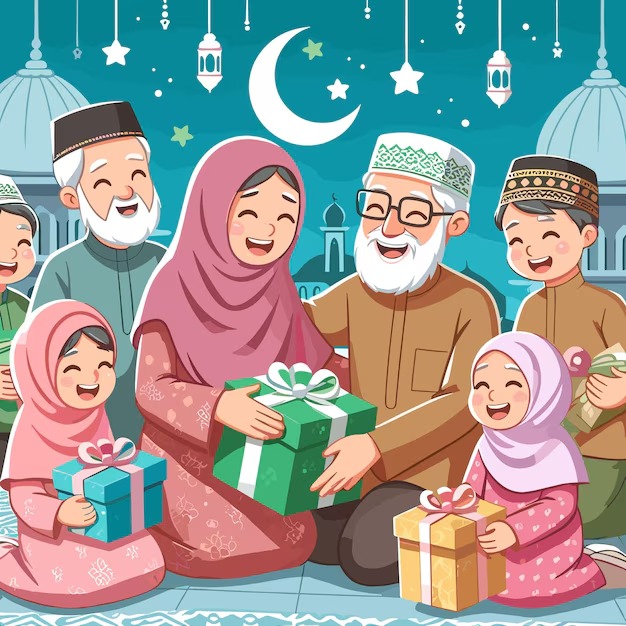The Sunnah of Gift-Giving: Islamic Tradition Encompasses Humanity

A newly converted young man once posted a heartfelt question on his Facebook account, seeking guidance from fellow Muslims on how to live by the Sunnah—the teachings of the beloved Prophet (peace and blessings be upon him). As he navigated his journey as a new Muslim, he was focused on understanding the five pillars of Islam: The Shahada (declaration of faith), establishing obligatory prayers, giving Zakat, fasting during Ramadan, and performing Hajj and Umrah.
In response, a fellow Muslim offered a brilliant explanation, highlighting that the term Sunnah in Arabic means "a path or a way to live by." This insight was tied to one of the Prophet’s profound sayings: “I have only been sent to perfect good morals” [Bukhari]. This pivotal hadith encompasses the essence of Islam, not just as the final message in a lineage of divinely revealed faiths but as a comprehensive way of life centered on moral excellence and compassion.
This understanding shifts the focus of the Sunnah from being solely about rituals to embodying acts of kindness, compassion, and humanity. It invites us to view the Sunnah as a guide to living harmoniously with others and contributing to the well-being of community.
One of the most accessible ways to bring the Sunnah into our daily lives is through the simple yet powerful act of giving gifts. A thoughtful gift can mend relationships, strengthen bonds, and convey love and appreciation—key principles in the Prophet’s teachings.
So, how can we reconnect with the Sunnah and make it the cornerstone of our humanitarian actions in today’s world? Could acts of kindness, starting with something as simple as a heartfelt gift, become the essence of how we live the Sunnah and reflect its timeless values?
Acts of Kindness: A Prophetic Practice
In the whirlwind of today’s fast-paced world, acts of kindness and thoughtfulness are often overshadowed by the relentless demands of modern life. Yet, the timeless tradition of gift-giving in Islam stands as a gentle reminder of the profound beauty in connecting with others through simple, meaningful gestures. Rooted in the Sunnah of the Prophet (peace and blessings be upon him), gift-giving transcends mere social niceties to become a powerful expression of love, generosity, and humanity.
The practice of giving gifts holds a special place in the Sunnah. The Prophet (peace and blessings be upon him) said: “Give gifts to one another, for gifts remove malice from the hearts” [Tirmidhi]. This succinct yet profound statement encapsulates the transformative power of gifts to heal wounds, build bridges, and nurture bonds of affection.
The Prophet’s life offers numerous examples of his approach to gift-giving. He often exchanged gifts with his Companions to foster brotherhood and strengthen communal ties. Importantly, he emphasized the sincerity and thoughtfulness of the gesture over the material value of the gift. Whether it was a cup of milk or a handful of dates, the Prophet graciously accepted even the humblest offerings, demonstrating that the worth of a gift lies in the love and intention with which it is given.
In our technology-driven world, where genuine human connections often take a backseat, the act of giving gifts becomes even more significant. The Sunnah reminds us that gifts need not be extravagant. Small, thoughtful gestures—a handwritten note, a carefully selected book, or a handmade item—can leave a lasting impact, especially in an era dominated by mass production. Acts of service, such as helping a friend with a task, preparing a meal, or simply offering one’s time, are equally powerful and align with the essence of Islamic teachings.
Modern advancements also offer new ways to uphold this tradition. Digital gifts, like e-books, charitable donations in someone’s name, or a heartfelt message, allow us to embrace technology while staying true to the spirit of the Sunnah. These gestures, though intangible, carry immense emotional and spiritual significance, reminding us that the essence of giving lies in the intention to connect and uplift.
Get Closer to Allah by Generosity
The Islamic perspective on gift-giving elevates it beyond material exchange to an act of worship and a means of drawing closer to Allah. The Qur’an extols generosity as a defining trait of the righteous: “[They] spend [in the cause of Allah] during ease and hardship...” (Qur'an 2: 177). When gifts are given with sincerity and the intention to please Allah, they transform into acts of charity (sadaqah), turning a seemingly mundane gesture into a source of spiritual reward and heart purification.
Intentions, as always in Islam, play a pivotal role in gift-giving. The Prophet (peace and blessings be upon him) said: “The reward of deeds depends upon the intentions, and every person will get the reward according to what he has intended” [Bukhari]. Thus, the focus of giving should be on strengthening relationships and fostering goodwill, rather than seeking recognition or reciprocation. Even the smallest, heartfelt gift can create a ripple effect of kindness and gratitude, reinforcing the sincerity behind the act.
To incorporate this Prophetic practice into daily life, start small. A simple token—a cup of coffee, a flower, or a warm smile—can brighten someone’s day and strengthen the bonds of affection. Teaching children the value of giving by involving them in selecting or creating gifts for loved ones ensures that this noble tradition is passed on to the next generations. Moreover, consider giving gifts spontaneously, outside of special occasions like Eid or weddings, as unexpected acts of kindness often carry greater emotional significance. Supporting local or ethical businesses when choosing gifts also aligns generosity with sustainability and community care.
By embracing these practices, we can revive the Sunnah of gift-giving, making it a means of spreading kindness, strengthening relationships, and reflecting the timeless values of Islam in our modern lives. This Prophetic practice is more than an act of love; it is a path to cultivating compassion, generosity, and unity within our communities.
 Arabic
Arabic French
French Deutsch
Deutsch Urdu
Urdu Pashto
Pashto Swahili
Swahili Hausa
Hausa
